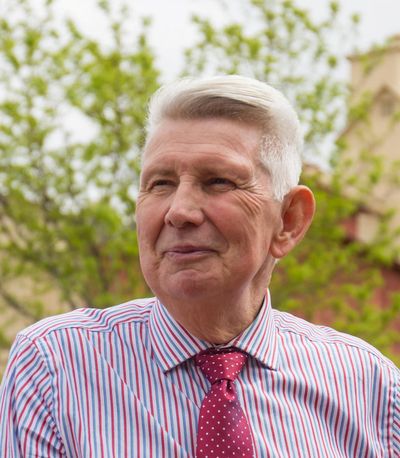Idaho congressional candidate wants to help Trump

Back in the political game after a nearly 25-year absence, former Idaho attorney general and Lewiston native David Leroy is hitching his campaign to the president’s wagon train.
Leroy, who served as attorney general from 1979 to ’83, followed by one term as lieutenant governor from 1983 to ’87, announced his candidacy earlier this year for the 1st Congressional District seat currently held by Congressman Raul Labrador.
Labrador is running for governor next year, and Leroy is eager to replace him – largely because Donald Trump is in the White House.
“This president is a change-agent,” he said. “With him in office, Republicans have an opportunity. If they get the proper legislation to him, he’ll sign it – so now’s the time to make the pendulum swing back toward limited government.”
Leroy, 70, was in Lewiston on Friday prior to attending Saturday’s homecoming game at the University of Idaho. He received his law degree there in 1971, and later served as Ada County prosecutor before being elected to state office.
Following his term as lieutenant governor, Leroy was the Republican nominee in the 1986 gubernatorial race. He lost to Cecil Andrus by fewer than 4,000 votes. President George H.W. Bush then appointed him to be U.S. nuclear waste negotiator; he served in that position from 1990 to ’93.
During the 1994 election cycle, Leroy was one of four Republicans running for the 1st Congressional District seat. He lost to Helen Chenoweth, marking his last campaign until this year.
“ ‘Citizen Dave’ was a pretty enjoyable gig,” Leroy said. “But I became convinced we have three years and three months to use the Trump presidency to save the republic. It’s a singular opportunity, if we use it right.”
The threats facing America are “fairly evident,” he said. They include Congress’ inability to pass any significant legislation and its addiction to spending, the dismantling of the health care system by Obamacare, the increasing regulatory burden on small businesses and schools, the threat of nuclear attack from North Korea and disrespect for the flag back home – which his campaign literature suggests is being orchestrated by “privileged liberals.”
Leroy’s prescription for these ills includes term limits for Congress, abolishing the Department of Education, revenue-neutral tax reform, across-the-board spending cuts and reducing regulations.
“I’m a firm believer that you’re not going to accomplish spending cuts by taking on special interest A or special interest B,” he said. “The only way to get it done is by cutting every budget at an equal level – including defense.”
He recommends a more individualistic approach to regulatory reform, however. Rules need to be examined one by one, to see which are effective and which need to be eliminated. He believes Idaho would have an advantage in that kind of approach, given its small-town atmosphere and ability of state and federal regulators to work together to decide what works best for the state.
Although he describes himself as a “constitutional conservative,” Leroy said he wouldn’t necessarily join the House Freedom Caucus, which supports many of his same goals, such as fiscal responsibility, limited government and states rights.
“I’m not going to automatically join any caucus,” he said. If anything, he’d be more likely to form an “Idaho Caucus” that would emphasize unity within the state’s congressional delegation and reach out to other small states, to provide a small-state perspective on issues.
Leroy goes up against two other prominent Republicans in the May primary: state Rep. Luke Malek, R-Coeur-d’Alene, and former state senator and gubernatorial candidate Russ Fulcher of Meridian. If he prevails and gets elected to Congress in the general election, he doesn’t plan to become a career politician.
“I’m not looking for lifetime work,” Leroy said. “I want to go back to Washington, contribute and then come back home and rest on my laurels.”